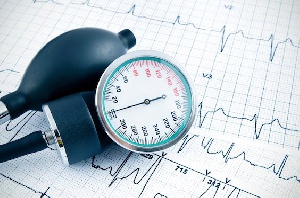Hypertension, also known as high blood pressure, has become quite common lately, claiming lots of lives in the country.
The effects of the disease have been such that even many young people have been forced to drop out of school because they lost their breadwinners through hypertension.
However, a bigger question is, what is hypertension, and what exactly causes it?
This article provides some insights into hypertension, its causes, and its dangers.
Overview
Hypertension has become rampant among young people in the country, many of whom are unaware of their status. This has become a major health concern due to the alarming rate at which this group is developing hypertension.
What is hypertension
Hypertension, also known as high blood pressure, is a medical condition in which the blood pressure in the arteries is consistently too high. Blood pressure is measured in millimetres of mercury (mmHg). It is expressed as two numbers: systolic pressure (the top number) and diastolic pressure (the bottom number).
Blood pressure ranges
Normal blood pressure: Less than 120/80mmHg
Elevated blood pressure: 120-129/80mmHg
Stage 1 hypertension: 130-139/80-89mmHg
Stage 2 hypertension: 140 or higher/90 or higher mmHg
Causes of hypertension and risk factors
Family history: Having a family history of hypertension increases the risk.
Age: The risk of developing hypertension increases with age.
Obesity: Being overweight or obese is a significant risk factor.
Lifestyle: Lack of physical exercise, smoking, and consuming a diet high in salt, sugar, and saturated fats contribute to hypertension.
Stress: Chronic stress can raise blood pressure.
Kidney diseases: Certain kidney diseases can cause hypertension.
Symptoms
Hypertension often has no particular symptoms, but some people may experience:
Headaches
Dizziness
Nosebleeds
Shortness of breath
Chest pain
Complications
Untreated hypertension can lead to serious health complications, which include:
Heart attack
Stroke
Vision loss
Kidney disease
Diagnosis
Hypertension is diagnosed using a sphygmomanometer, which measures the pressure in the arteries.
Treatment
Treatment of hypertension usually involves a combination of medication and lifestyle changes.
What can be done?
Education and awareness: Raising awareness about hypertension and its dangers can help regulate it.
Regular checkup: Having regular checks can help reduce the dangers.
Medication and positive lifestyle: Always take your medication, which helps to remove excess fluid from the body.
Lifestyle Changes: Engage in moderate-intensity physical activity.
Eat a balanced diet focused on whole, unprocessed foods.
Stay hydrated by drinking lots of water.
Reduce salt intake.
Manage stress by engaging in stress-reducing activities like yoga.
Conclusion
Regular blood pressure checks and a healthy lifestyle can help identify and manage hypertension regardless of age.
MRA/AE
You can also watch a compilation of the latest Twi news on GhanaWeb TV below:
Health News of Friday, 21 March 2025
Source: www.ghanaweb.com













